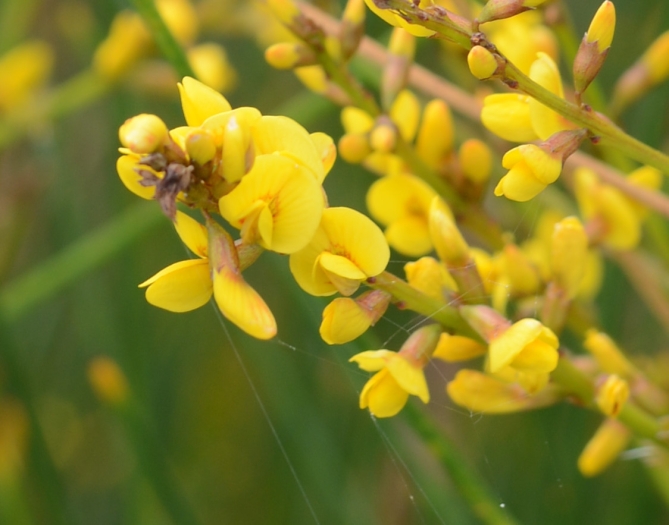Golden Spray
(Viminaria juncea)
Golden Spray (Viminaria juncea)
/
/

ronavery
CC BY 4.0
Image By:
ronavery
Recorded By:
Copyright:
CC BY 4.0
Copyright Notice:
Photo by: ronavery | License Type: CC BY 4.0 | License URL: http://creativecommons.org/licenses/by/4.0/ | Rights Holder: ronavery | Publisher: iNaturalist | Date Created: 2020-10-18T13:10:40-07:00 |




















Estimated Native Range
Summary
Viminaria juncea, commonly known as Golden Spray, is a deciduous shrub native to the wetlands, swamps, and along the margins of rivers and streams in Australia. It exhibits an erect or weeping habit, reaching 1.5–6 m (4.9–19.7 ft) in height and 1–2.5 m (3.3–8.2 ft) in width. The plant features a smooth trunk with ascending branches, while the slender branchlets often droop. Its distinctive leaves are reduced to long, thin petioles measuring 3–25 cm (1.2–9.8 in) in length. Golden Spray produces showy yellow flowers with an orange corolla, typically pea-shaped, from September to January on racemes up to 25 cm (10 in) long. These are followed by small pods containing single seeds. Notable for its rapid growth rate, Golden Spray can, however, lose vigor after 5 to 10 years.
Golden Spray is valued for its bright yellow, ornamental flowers and its ability to adapt to a range of soil conditions, though it prefers acidic to neutral soils. It is often used for revegetation projects, ornamental waterside plantings, and as a feature shrub in gardens. Hardy to temperatures down to −4 °C, it requires full sun to part shade and can tolerate various water regimes, from low to ample moisture. Plants grown from seed tend to be more robust than those from cuttings. Potential problems include susceptibility to root rot in poorly drained soils and a relatively short lifespan in cultivation.CC BY-SA 4.0
Golden Spray is valued for its bright yellow, ornamental flowers and its ability to adapt to a range of soil conditions, though it prefers acidic to neutral soils. It is often used for revegetation projects, ornamental waterside plantings, and as a feature shrub in gardens. Hardy to temperatures down to −4 °C, it requires full sun to part shade and can tolerate various water regimes, from low to ample moisture. Plants grown from seed tend to be more robust than those from cuttings. Potential problems include susceptibility to root rot in poorly drained soils and a relatively short lifespan in cultivation.CC BY-SA 4.0
Plant Description
- Plant Type: Shrub, Tree
- Height: 5-20 feet
- Width: 3-8 feet
- Growth Rate: Moderate
- Flower Color: Yellow
- Flowering Season: Spring
- Leaf Retention: Evergreen
Growth Requirements
- Sun: Full Sun, Part Shade
- Water: Medium, High
- Drainage: Slow, Medium, Fast
Common Uses
Bee Garden, Bird Garden, Butterfly Garden, Low Maintenance, Potted Plant
Natural Habitat
Native to wetlands, swamps, and along the margins of rivers and streams in Australia
Other Names
Common Names: Native Broom
Scientific Names: , Viminaria juncea, Viminaria denudata, Daviesia juncea, Pultenaea juncea, Spartium filifolium, Genista filifolia, Daviesia denudata, Sophora juncea, Viminaria preissii,
GBIF Accepted Name: Viminaria juncea (Schrad.) Hoffmanns.